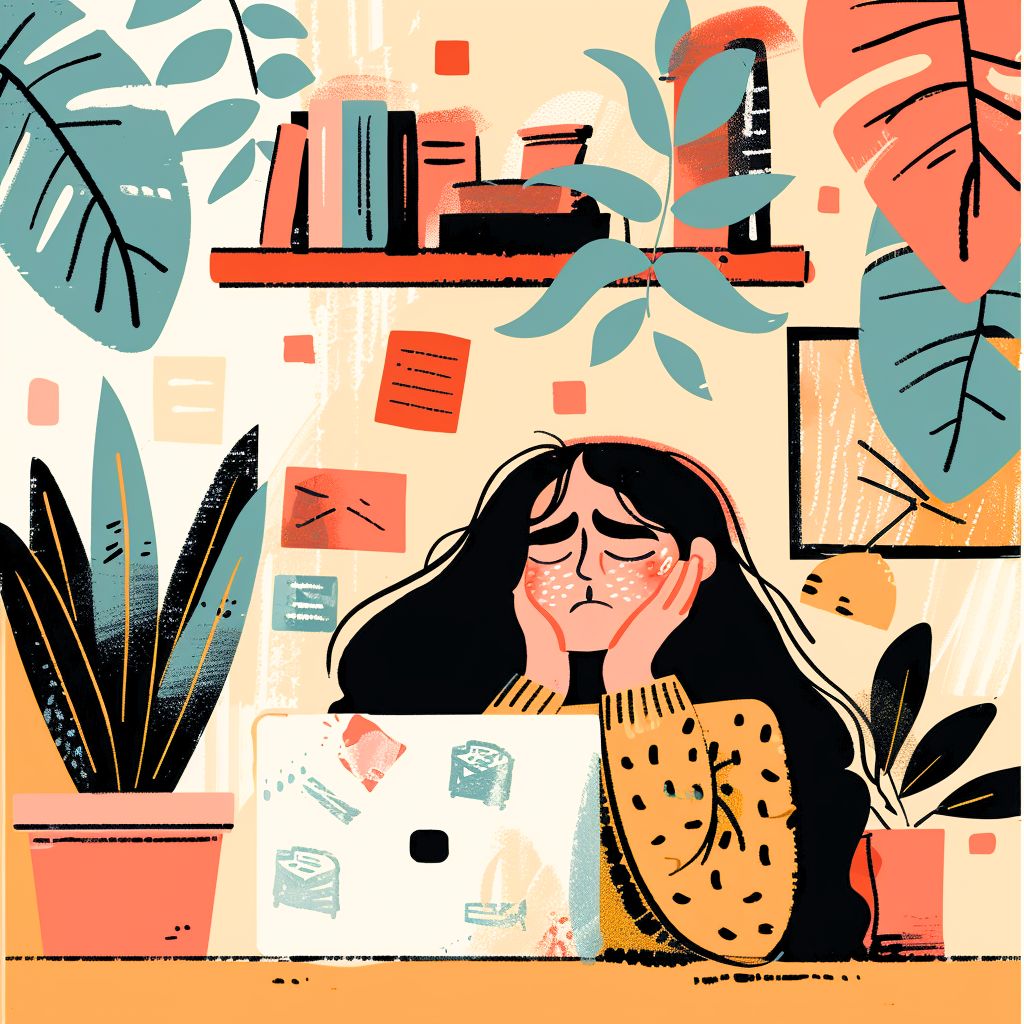Alright, language enthusiasts and word nerds, gather ’round! We’re about to embark on a wild ride through the jungle of new mental health vocabulary. Buckle up, because things are about to get interesting!
You know how sometimes you feel a certain way, but you just can’t put your finger on the right word? Well, fear not! The English language, ever-evolving and always on point, has been cooking up some fresh terms to help us navigate the crazy rollercoaster of modern life and mental health.
From the depths of social media to the highs (and lows) of remote work, we’ve got new words popping up faster than you can say “unprecedented times.” And trust me, these aren’t your grandma’s vocabulary words – unless your grandma is super hip, in which case, go grandma!
In this article, we’re diving deep into ten spanking new terms reshaping how we talk about our mental state, relationships, and the general weirdness of existing in the 2020s. Whether you’re a self-proclaimed wordsmith or just someone trying to figure out why you feel so “blah” lately, this list has got you covered.
So, grab your favorite beverage, get comfy, and prepare to expand your linguistic horizons. By the time we’re done, you’ll be dropping these terms like a pro at your next Zoom happy hour (and yes, “Zoom fatigue” is totally on this list).
Ready to level up your mental health vocab game? Let’s dive in and explore these mind-bending new additions to our linguistic landscape. Who knows? You might just find the perfect word to describe that weird feeling you’ve been having lately. Let’s go!
1. Trauma dumping
Alright, let’s talk about trauma dumping – the verbal equivalent of opening Pandora’s box in the middle of a casual conversation. This bad boy is when someone unloads their heavy, often traumatic experiences on an unsuspecting victim without checking if they’re ready for an emotional avalanche.
Trauma dumping is like emotional skydiving without a parachute – intense, unexpected, and potentially disastrous for everyone involved. It’s that moment when your coworker starts detailing their messy divorce over a water cooler chat, or when your second cousin twice removed spills their entire life story in the Facebook comments of your cat photo.
Now, don’t get me wrong – talking about our problems is important. But there’s a time and a place, folks! Trauma dumping often leaves the listener feeling overwhelmed, anxious, and maybe a little like they’ve been hit by an emotional truck. It’s the conversational equivalent of dropping a boulder on someone just trying to have a nice picnic.
The rise of social media has made trauma dumping easier than ever. Anyone can broadcast their deepest, darkest secrets to the world with just a few taps. It’s like we’ve all become contestants on a reality show no one signed up for. #oversharing, anyone?
So, how do you spot a trauma dump in the wild? Look out for those long, heavy messages that come out of nowhere. If you find yourself thinking, “Whoa, this is way too much information,” or “I am not qualified to handle this,” congratulations – you’ve probably been trauma-dumped.
Sample sentence: “I thought Jenny and I were just going to grab a quick coffee, but she started trauma dumping about her toxic relationship history. Two hours and three lattes later, I felt like I needed therapy just from listening!”
2. Quiet quitting
Welcome to the world of quiet quitting, where “above and beyond” gets kicked to the curb and “bare minimum” becomes the new gold standard. It’s not about storming out of the office in a blaze of glory – nope, this is the art of doing just enough to keep your job while waving goodbye to that “work is life” mentality.
Quiet quitting is like the workplace equivalent of a French exit at a party – you’re still there, but you’re not exactly the life and soul anymore. It’s when you decide that your 9-to-5 is going to be exactly that – no more, no less. Goodbye unpaid overtime, sayonara weekend emails, and au revoir to being the office superhero.
This trend exploded faster than a microwave burrito during the Great Resignation. People everywhere started realizing that maybe, just maybe, their entire existence shouldn’t revolve around TPS reports and team-building exercises. It’s like a collective lightbulb moment: “Wait, you mean I don’t have to sacrifice my firstborn for a job that barely covers my avocado toast habit?”
Quiet quitters aren’t slackers – they’re boundary-setters. They’re the ones who’ve decided that “work-life balance” isn’t just a cute phrase to throw around in job interviews. They’re doing their jobs, sure, but they’re not letting their jobs do them in.
Of course, management types aren’t exactly thrilled about this trend. To them, quiet quitting is as appealing as a root canal without anesthesia. But for many workers, it’s a sanity-saving revelation.
Sample sentence: “After his boss ‘forgot’ to give him a raise for the third year running, Mike embraced quiet quitting with gusto. Now, he logs off at 5 PM sharp, even if the building’s on fire – that’s tomorrow Mike’s problem.”
3. Doom-scrolling
Ah, doom-scrolling – the digital equivalent of picking at a scab. You know you should stop, but you just. Can’t. Resist. It’s that late-night ritual of endlessly scrolling through bad news, disaster updates, and apocalyptic predictions until your eyes glaze over and your faith in humanity packs its bags and heads for the hills.
This habit hit the big time during the pandemic, when we all suddenly had way too much time on our hands and a burning desire to know exactly how screwed we were. It’s like our brains decided, “Hey, you know what would make this global crisis better? Reading every single terrifying detail about it!”
Doom-scrolling is the junk food of the internet world. You know it’s bad for you, but it’s oh-so-addictive. One minute you’re checking the weather, and the next thing you know, it’s 3 AM and you’re reading about how murder hornets are teaming up with the murder hornets to end civilization as we know it.
The worst part? Doom-scrolling is a vicious cycle. The more anxious you feel, the more you scroll. The more you scroll, the more anxious you feel. It’s like a hamster wheel of horror, except the hamster is your mental health, and the wheel is made of headlines screaming, “The End Is Nigh!”
But why do we do it? Some say it’s our brain’s way of preparing for threats. Others think it’s a twisted form of entertainment. Either way, it’s about as healthy as a diet of pure cotton candy and energy drinks.
Sample sentence: “I told myself I’d check the news for five minutes, but three hours of doom-scrolling later, I was convinced the world was ending and I needed to learn how to farm crickets for protein.”
The cure for doom-scrolling? Some say it’s as simple as putting down your phone (yeah, right). Others recommend curating your feed to include more puppies and fewer predictions of impending doom. Whatever works for you – just remember, the world probably isn’t ending, but your sleep schedule might be if you keep this up!
4. Zoom fatigue
Remember when video calls were exciting? Yeah, me neither. Welcome to the world of Zoom fatigue, where your brain feels like it’s been put through a digital blender and your eyes are begging for mercy.
Zoom fatigue is that particular kind of exhaustion that comes from staring at a screen full of talking heads for hours on end. It’s like your mind is stuck in an endless loop of “You’re on mute,” “Can everyone see my screen?” and awkward virtual backgrounds.
This phenomenon exploded faster than you can say “unprecedented times” when the whole world suddenly went remote. We went from occasional video chats to living our entire lives through a webcam. Suddenly, every meeting, happy hour, family gathering, and even first date was happening through the magic of video conferencing.
But here’s the kicker: turns out, our brains aren’t wired for this digital face-time overload. We’re subconsciously trying to read body language that’s not there, struggling to make eye contact with a camera, and fighting the urge to check ourselves out in that little self-view window. It’s like trying to run a marathon while solving a Rubik’s cube – exhausting and slightly nauseating.
And let’s not forget the joy of technical difficulties. Nothing says “productive meeting” like freezing mid-sentence or having your cat’s tail suddenly take over the screen. It’s enough to make you long for the days of good old-fashioned conference calls, where you could at least roll your eyes without anyone seeing.
Sample sentence: “By Friday afternoon, Alex’s Zoom fatigue was so bad, he seriously considered using a cardboard cutout of himself for the last call and hoped no one would notice the difference.”
5. Eco-anxiety
Buckle up, folks, because eco-anxiety is the emotional rollercoaster you never bought a ticket for. It’s that pit in your stomach every time you hear about melting ice caps, the twinge of guilt when you forget your reusable bags, and the overwhelming urge to hug a tree (or maybe become one).
Eco-anxiety is the mental health equivalent of watching a nature documentary narrated by David Attenborough while sitting in a room full of plastic straws. It’s the nagging feeling that Mother Nature is giving us the side-eye, and we totally deserve it.
This lovely little mental state has gained traction faster than a Tesla on a freeway. As we become more aware of our environmental impact, our brains are like, “Cool, cool, let’s add ‘the fate of the entire planet’ to our list of things to stress about.”
The symptoms? They range from mild worry when you see a sea turtle to full-blown panic attacks about the polar bear population. You might find yourself obsessively sorting recycling, having nightmares about rising sea levels, or seriously considering a life as a zero-waste hermit in the woods.
But here’s the kicker: eco-anxiety isn’t just for tree-huggers anymore. It’s gone mainstream, baby! Even your cousin who used to roll coal for fun is starting to sweat about carbon footprints.
Sample sentence: “Lisa’s eco-anxiety kicked into overdrive after watching that glacier documentary. Now she’s considering a career change to professional tree-hugger and debates the ethics of having children in a world where ‘water wars’ might be a real thing.”
6. Ghostlighting
Ever feel like you’re being haunted by a particularly frustrating poltergeist? Welcome to the world of ghostlighting, where the ghosts of relationships past come back to mess with your head!
Ghostlighting is the unholy lovechild of ghosting and gaslighting. It’s when someone pulls a Houdini on you, vanishing into thin air, only to reappear months later acting like nothing happened. It’s emotional whiplash with a side of “Am I going crazy?”
Picture this: You’re finally over that person who left you on read faster than you can say “commitment issues.” You’ve deleted their number, purged your Instagram of couple pics, and you’re ready to live your best life. Then BAM! They slide into your DMs with a casual “Hey, what’s up?” as if they didn’t just spend the last six months being deader than your houseplants.
This phenomenon is like a bad zombie movie – just when you think it’s safe, the ex rises from the grave of forgotten Tinder matches to eat your brains (or at least your peace of mind). It leaves you questioning reality faster than a philosophy major on their first day of class.
The worst part? Ghostlighters are masters of making you feel like you’re the crazy one. “What do you mean I disappeared? I’ve just been really busy!” Yeah, sure, buddy. So busy you couldn’t send a single text for half a year? Were you trapped in a wi-fi-less cave?
Sample sentence: “Jake thought he was finally over his ex, but her ghostlighting behavior – disappearing for months, then suddenly texting as if nothing happened – left him feeling like he was starring in his own personal episode of ‘The Twilight Zone.'”
So, how do you deal with a ghostlighter? Experts suggest setting boundaries firmer than your grandma’s Jell-O mold. Or, you know, you could always fight fire with fire and pretend you have no idea who they are. “New phone, who dis?” has never been more appropriate.
Ghostlighting: because sometimes, the only thing scarier than ghosts is an ex who can’t make up their mind.
P.S. Ghostlighting is yet another example of a Portmanteau Word. If neologisms are your thing, check out our mashup list of Portmanteau words!
7. Revenge bedtime procrastination
Alright, night owls, this one’s for you! Revenge bedtime procrastination is the rebellious teenager of sleep habits. It’s when you know you should be catching Z’s, but instead you’re catching up on TikToks, binge-watching that new series, or finally learning how to juggle (because why not?).
This delightful habit is all about reclaiming your personal time, even if it means giving your future, sleepy self a big ol’ middle finger. It’s like your brain is saying, “Oh, you had me adulting all day? Well, watch me stay up till 3 AM reading fan theories about that obscure TV show I watched ten years ago!”
The “revenge” part comes from the feeling that you’re getting back at your daytime responsibilities. Your job might own your 9-to-5, but by god, 1 AM is yours to waste as you please! It’s a tiny rebellion against the tyranny of alarm clocks and socially acceptable bedtimes.
Of course, this habit is about as healthy as a diet of pure cotton candy. You’re essentially stealing time from your future self, who will wake up grumpier than a bear with a sore head. But in the moment? Oh boy, does it feel good to be bad!
The worst part is that revenge bedtime procrastination is a vicious cycle. You stay up late, you’re tired the next day, and you don’t have energy for fun stuff after work, so you stay up late again to make up for it. It’s like a hamster wheel, but the hamster is caffeinated and slightly delirious.
Sample sentence: “Even though he had a 6 AM flight, Carlos embraced revenge bedtime procrastination and binged an entire season of ‘The Office’. Future Carlos problem, right?”
8. Empath
Feeling everyone’s feelings? Welcome to the world of empaths, the human equivalent of emotional sponges. These folks don’t just understand your emotions – they practically live them.
Being an empath is like having a superpower that equals blessing and curse. Imagine walking into a room and suddenly being hit with everyone’s emotions. It’s like emotional surround sound, but you can’t find the remote to turn it down.
Empaths are the ones who can tell you’re having a bad day before you’ve even opened your mouth. They’re the friends who start tearing up during sad movies before the sad part even happens. It’s like they’ve got an emotional WiFi connection to everyone around them, and there’s no off switch.
This trait goes beyond just being a good listener or having a shoulder to cry on. Empaths often feel physical symptoms in response to others’ emotions. Your friend’s got a headache? Suddenly, the empath’s head is pounding too. It’s like playing emotional charades, except nobody told them the rules.
The downside? Being an empath can be exhausting. Crowded places become emotional minefields. Watching the news feels like getting punched in the feelings. And don’t even get them started on family gatherings – it’s like being trapped in an emotional pressure cooker.
Sample sentence: “As an empath, going to the mall during holiday shopping season is Emma’s hell. It’s like being stuck in a blender of stress, excitement, frustration, and ‘Jingle Bell Rock’ on repeat.”
9. Languishing
Feel like you’re stuck in neutral, not exactly depressed but definitely not thriving? Welcome to languishing, the emotional equivalent of a waiting room with muzak playing softly in the background.
Languishing is the uninvited guest who showed up during the pandemic and decided to crash on our collective couch indefinitely. It’s that “meh” feeling that’s settled over you like a slightly damp blanket. Not sad enough to be depressed, not happy enough to be, well, happy. It’s the mental health middle child, constantly overlooked but definitely making its presence known.
This state of being is like trying to run through waist-deep Jell-O. You’re moving, sure, but you’re not getting anywhere fast. Your motivation has packed its bags and gone on an extended vacation. Joy? That’s something that happens to other people. You’re just… here.
Languishing is when you can’t remember the last time you felt genuinely excited about something. Netflix has lost its thrill, sourdough is so last year, and even your houseplants look bored. It’s the feeling of being stuck in a time loop where every day is just slightly less interesting than the last.
Sample sentence: “Post-pandemic, Alex found himself languishing. Work felt pointless, hobbies seemed like too much effort, and he couldn’t shake the feeling that he was watching his life through a slightly dirty window.”

Hey fellow Linguaholics! It’s me, Marcel. I am the proud owner of linguaholic.com. Languages have always been my passion and I have studied Linguistics, Computational Linguistics and Sinology at the University of Zurich. It is my utmost pleasure to share with all of you guys what I know about languages and linguistics in general.







